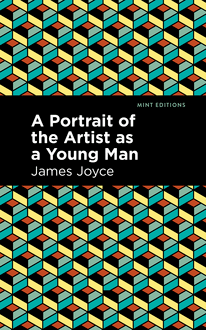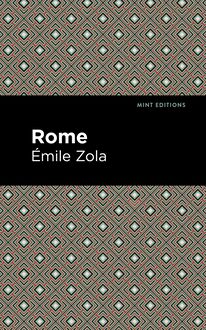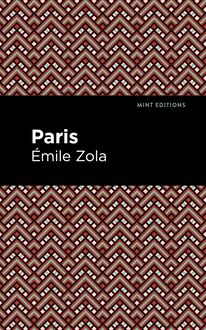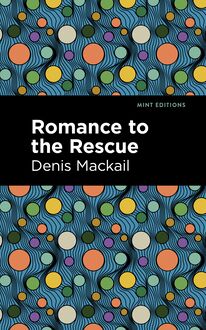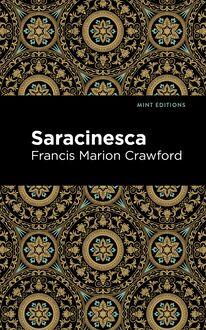-
 Univers
Univers
-
 Ebooks
Ebooks
-
 Livres audio
Livres audio
-
 Presse
Presse
-
 Podcasts
Podcasts
-
 BD
BD
-
 Documents
Documents
-
- Cours
- Révisions
- Ressources pédagogiques
- Sciences de l’éducation
- Manuels scolaires
- Langues
- Travaux de classe
- Annales de BEP
- Etudes supérieures
- Maternelle et primaire
- Fiches de lecture
- Orientation scolaire
- Méthodologie
- Corrigés de devoir
- Annales d’examens et concours
- Annales du bac
- Annales du brevet
- Rapports de stage
La lecture à portée de main
Vous pourrez modifier la taille du texte de cet ouvrage
Découvre YouScribe en t'inscrivant gratuitement
Je m'inscrisDécouvre YouScribe en t'inscrivant gratuitement
Je m'inscrisEn savoir plus
Vous pourrez modifier la taille du texte de cet ouvrage
En savoir plus

Description
Rome (1896) is a novel by French author Émile Zola. Rome is the second installment in Zola’s celebrated Three Cities Trilogy. Published toward the end of Zola’s career, the trilogy is an ambitious, sweeping study of one man’s struggle with faith in political, religious, and social life. Following his protagonist Abbé Pierre Froment, Zola provides a striking portrait of the soul of modern man in crisis with itself and with an ever-changing world. In Rome, Abbé Froment—inspired by his pilgrimage to the holy city of Lourdes—writes a book on socialistic Catholicism aimed at reforming the Church in order to benefit its most vulnerable subjects. Facing censure from Vatican officials, he travels to the heart of the Catholic world, where he hopes to gain an audience with the Pope in order to vindicate himself. Filled with hope, and perhaps more than a little naïve, Froment believes he can inspire radical institutional changes for the Church. When he gets to Rome, however, he finds himself waiting endlessly for his chance to arrive. As days turn into weeks, and weeks turn to months, Pierre grows tired of the city’s ancient beauty, which never fails to remind him of his fate as a member of an institution brought low by its commitment to tradition. Soon, he is faced with a choice—to continue to hope for change, or to change his own, small life. With a beautifully designed cover and professionally typeset manuscript, this edition of Émile Zola’s Rome is a classic work of French literature reimagined for modern readers.
Sujets
Informations
| Publié par | Mint Editions |
| Date de parution | 11 mai 2021 |
| Nombre de lectures | 0 |
| EAN13 | 9781513295152 |
| Langue | English |
| Poids de l'ouvrage | 3 Mo |
Informations légales : prix de location à la page 0,0600€. Cette information est donnée uniquement à titre indicatif conformément à la législation en vigueur.
Extrait
Rome
Émile Zola
Rome was first published in 1896.
This edition published by Mint Editions 2021.
ISBN 9781513292304 | E-ISBN 9781513295152
Published by Mint Editions®
minteditionbooks.com
Publishing Director: Jennifer Newens
Design & Production: Rachel Lopez Metzger
Project Manager: Micaela Clark
Translated by: Ernest A. Vizetelly
Typesetting: Westchester Publishing Services
C ONTENTS P ART I I II III P ART II IV V VI P ART III VII VIII IX P ART IV X XI XII XIII P ART V XIV XV XVI
PART I
I
T he train had been greatly delayed during the night between Pisa and Civita Vecchia, and it was close upon nine o’clock in the morning when, after a fatiguing journey of twenty-five hours’ duration, Abbe Pierre Froment at last reached Rome. He had brought only a valise with him, and, springing hastily out of the railway carriage amidst the scramble of the arrival, he brushed the eager porters aside, intent on carrying his trifling luggage himself, so anxious was he to reach his destination, to be alone, and look around him. And almost immediately, on the Piazza dei Cinquecento, in front of the railway station, he climbed into one of the small open cabs ranged alongside the footwalk, and placed the valise near him after giving the driver this address:
“Via Giulia, Palazzo Boccanera.” 1
It was a Monday, the 3rd of September, a beautifully bright and mild morning, with a clear sky overhead. The cabby, a plump little man with sparkling eyes and white teeth, smiled on realising by Pierre’s accent that he had to deal with a French priest. Then he whipped up his lean horse, and the vehicle started off at the rapid pace customary to the clean and cheerful cabs of Rome. However, on reaching the Piazza delle Terme, after skirting the greenery of a little public garden, the man turned round, still smiling, and pointing to some ruins with his whip,
“The baths of Diocletian,” said he in broken French, like an obliging driver who is anxious to court favour with foreigners in order to secure their custom.
Then, at a fast trot, the vehicle descended the rapid slope of the Via Nazionale, which dips down from the summit of the Viminalis, 2 where the railway station is situated. And from that moment the driver scarcely ceased turning round and pointing at the monuments with his whip. In this broad new thoroughfare there were only buildings of recent erection. Still, the wave of the cabman’s whip became more pronounced and his voice rose to a higher key, with a somewhat ironical inflection, when he gave the name of a huge and still chalky pile on his left, a gigantic erection of stone, overladen with sculptured work-pediments and statues.
“The National Bank!” he said.
Pierre, however, during the week which had followed his resolve to make the journey, had spent wellnigh every day in studying Roman topography in maps and books. Thus he could have directed his steps to any given spot without inquiring his way, and he anticipated most of the driver’s explanations. At the same time he was disconcerted by the sudden slopes, the perpetually recurring hills, on which certain districts rose, house above house, in terrace fashion. On his right-hand clumps of greenery were now climbing a height, and above them stretched a long bare yellow building of barrack or convent-like aspect.
“The Quirinal, the King’s palace,” said the driver.
Lower down, as the cab turned across a triangular square, Pierre, on raising his eyes, was delighted to perceive a sort of aerial garden high above him—a garden which was upheld by a lofty smooth wall, and whence the elegant and vigorous silhouette of a parasol pine, many centuries old, rose aloft into the limpid heavens. At this sight he realised all the pride and grace of Rome.
“The Villa Aldobrandini,” the cabman called.
Then, yet lower down, there came a fleeting vision which decisively impassioned Pierre. The street again made a sudden bend, and in one corner, beyond a short dim alley, there was a blazing gap of light. On a lower level appeared a white square, a well of sunshine, filled with a blinding golden dust; and amidst all that morning glory there arose a gigantic marble column, gilt from base to summit on the side which the sun in rising had laved with its beams for wellnigh eighteen hundred years. And Pierre was surprised when the cabman told him the name of the column, for in his mind he had never pictured it soaring aloft in such a dazzling cavity with shadows all around. It was the column of Trajan.
The Via Nazionale turned for the last time at the foot of the slope. And then other names fell hastily from the driver’s lips as his horse went on at a fast trot. There was the Palazzo Colonna, with its garden edged by meagre cypresses; the Palazzo Torlonia, almost ripped open by recent “improvements”; the Palazzo di Venezia, bare and fearsome, with its crenelated walls, its stern and tragic appearance, that of some fortress of the middle ages, forgotten there amidst the commonplace life of nowadays. Pierre’s surprise increased at the unexpected aspect which certain buildings and streets presented; and the keenest blow of all was dealt him when the cabman with his whip triumphantly called his attention to the Corso, a long narrow thoroughfare, about as broad as Fleet Street, 3 white with sunshine on the left, and black with shadows on the right, whilst at the far end the Piazza del Popolo (the Square of the People) showed like a bright star. Was this, then, the heart of the city, the vaunted promenade, the street brimful of life, whither flowed all the blood of Rome?
However, the cab was already entering the Corso Vittorio Emanuele, which follows the Via Nazionale, these being the two piercings effected right across the olden city from the railway station to the bridge of St. Angelo. On the left-hand the rounded apsis of the Gesu church looked quite golden in the morning brightness. Then, between the church and the heavy Altieri palace which the “improvers” had not dared to demolish, the street became narrower, and one entered into cold, damp shade. But a moment afterwards, before the facade of the Gesu, when the square was reached, the sun again appeared, dazzling, throwing golden sheets of light around; whilst afar off at the end of the Via di Ara Coeli, steeped in shadow, a glimpse could be caught of some sunlit palm-trees.
“That’s the Capitol yonder,” said the cabman.
The priest hastily leant to the left, but only espied the patch of greenery at the end of the dim corridor-like street. The sudden alternations of warm light and cold shade made him shiver. In front of the Palazzo di Venezia, and in front of the Gesu, it had seemed to him as if all the night of ancient times were falling icily upon his shoulders; but at each fresh square, each broadening of the new thoroughfares, there came a return to light, to the pleasant warmth and gaiety of life. The yellow sunflashes, in falling from the house fronts, sharply outlined the violescent shadows. Strips of sky, very blue and very benign, could be perceived between the roofs. And it seemed to Pierre that the air he breathed had a particular savour, which he could not yet quite define, but it was like that of fruit, and increased the feverishness which had possessed him ever since his arrival.
The Corso Vittorio Emanuele is, in spite of its irregularity, a very fine modern thoroughfare; and for a time Pierre might have fancied himself in any great city full of huge houses let out in flats. But when he passed before the Cancelleria, 4 Bramante’s masterpiece, the typical monument of the Roman Renascence, his astonishment came back to him and his mind returned to the mansions which he had previously espied, those bare, huge, heavy edifices, those vast cubes of stone-work resembling hospitals or prisons. Never would he have imagined that the famous Roman “palaces” were like that, destitute of all grace and fancy and external magnificence. However, they were considered very fine and must be so; he would doubtless end by understanding things, but for that he would require reflection. 5
All at once the cab turned out of the populous Corso Vittorio Emanuele into a succession of winding alleys, through which it had difficulty in making its way. Quietude and solitude now came back again; the olden city, cold and somniferous, followed the new city with its bright sunshine and its crowds. Pierre remembered the maps which he had consulted, and realised that he was drawing near to the Via Giulia, and thereupon his curiosity, which had been steadily increasing, augmented to such a point that he suffered from it, full of despair at not seeing more and learning more at once. In the feverish state in which he had found himself ever since leaving the station, his astonishment at not finding things such as he had expected, the many shocks that his imagination had received, aggravated his passion beyond endurance, and brought him an acute desire to satisfy himself immediately. Nine o’clock had struck but a few minutes previously, he had the whole morning before him to repair to the Boccanera palace, so why should he not at once drive to the classic spot, the summit whence one perceives the whole of Rome spread out upon her seven hills? And when once this thought had entered into his mind it tortured him until he was at last compelled to yield to it.
The driver no longer turned his head, so that Pierre rose up to give him this new address: “To San Pietro in Montorio!”
On hearing him the man at first looked astonished, unable to understand. He indicated with his whip that San Pietro was yonder, far away. However, as the priest insisted, he again smiled complacently, with a friendly nod of his head. All right! For his own part he was quite willing.
The horse then went on at a more rapid pace through the maze of narrow streets. One of these was pent between high walls, and the daylight descended into it as into a deep trench. But at t
-
 Univers
Univers
-
 Ebooks
Ebooks
-
 Livres audio
Livres audio
-
 Presse
Presse
-
 Podcasts
Podcasts
-
 BD
BD
-
 Documents
Documents
-
Jeunesse
-
Littérature
-
Ressources professionnelles
-
Santé et bien-être
-
Savoirs
-
Education
-
Loisirs et hobbies
-
Art, musique et cinéma
-
Actualité et débat de société
-
Jeunesse
-
Littérature
-
Ressources professionnelles
-
Santé et bien-être
-
Savoirs
-
Education
-
Loisirs et hobbies
-
Art, musique et cinéma
-
Actualité et débat de société
-
Actualités
-
Lifestyle
-
Presse jeunesse
-
Presse professionnelle
-
Pratique
-
Presse sportive
-
Presse internationale
-
Culture & Médias
-
Action et Aventures
-
Science-fiction et Fantasy
-
Société
-
Jeunesse
-
Littérature
-
Ressources professionnelles
-
Santé et bien-être
-
Savoirs
-
Education
-
Loisirs et hobbies
-
Art, musique et cinéma
-
Actualité et débat de société
- Cours
- Révisions
- Ressources pédagogiques
- Sciences de l’éducation
- Manuels scolaires
- Langues
- Travaux de classe
- Annales de BEP
- Etudes supérieures
- Maternelle et primaire
- Fiches de lecture
- Orientation scolaire
- Méthodologie
- Corrigés de devoir
- Annales d’examens et concours
- Annales du bac
- Annales du brevet
- Rapports de stage


